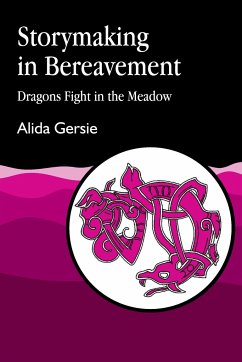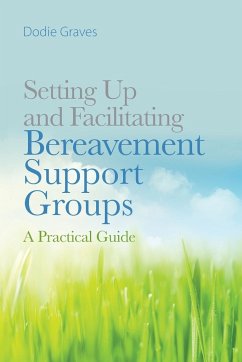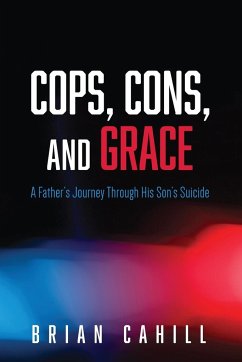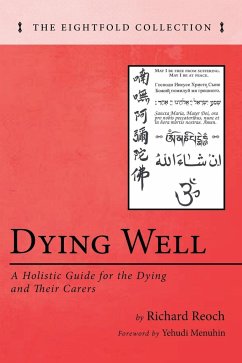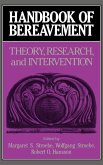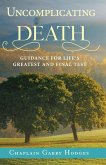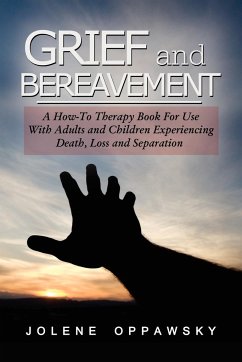- Broschiertes Buch
- Merkliste
- Auf die Merkliste
- Bewerten Bewerten
- Teilen
- Produkt teilen
- Produkterinnerung
- Produkterinnerung
In this book the author reflects on the processes of grief and more than 50 folk tales are included. The ancient stories vividly convey mankind's struggle with death and loss, the despair and hope, with bitterness and love. The use of stories in therapy is explained, specifically bereavement counselling through storymaking.
Andere Kunden interessierten sich auch für
![Setting Up and Facilitating Bereavement Support Groups Setting Up and Facilitating Bereavement Support Groups]() Dodie GravesSetting Up and Facilitating Bereavement Support Groups36,99 €
Dodie GravesSetting Up and Facilitating Bereavement Support Groups36,99 €![Cops, Cons, and Grace Cops, Cons, and Grace]() Brian CahillCops, Cons, and Grace24,99 €
Brian CahillCops, Cons, and Grace24,99 €![Inside My Head Inside My Head]() Jennie OgilvieInside My Head20,99 €
Jennie OgilvieInside My Head20,99 €![Dying Well Dying Well]() Richard ReochDying Well52,99 €
Richard ReochDying Well52,99 €![Handbook of Bereavement Handbook of Bereavement]() S. Stroebe / Wolfgang Stroebe / O. Hansson (eds.)Handbook of Bereavement209,99 €
S. Stroebe / Wolfgang Stroebe / O. Hansson (eds.)Handbook of Bereavement209,99 €![Uncomplicating Death Uncomplicating Death]() Garry HodgesUncomplicating Death8,49 €
Garry HodgesUncomplicating Death8,49 €![Grief and Bereavement Grief and Bereavement]() Jolene OppawskyGrief and Bereavement21,99 €
Jolene OppawskyGrief and Bereavement21,99 €-
-
-
In this book the author reflects on the processes of grief and more than 50 folk tales are included. The ancient stories vividly convey mankind's struggle with death and loss, the despair and hope, with bitterness and love. The use of stories in therapy is explained, specifically bereavement counselling through storymaking.
Hinweis: Dieser Artikel kann nur an eine deutsche Lieferadresse ausgeliefert werden.
Hinweis: Dieser Artikel kann nur an eine deutsche Lieferadresse ausgeliefert werden.
Produktdetails
- Produktdetails
- Verlag: Jessica Kingsley Publishers, Ltd
- Seitenzahl: 344
- Erscheinungstermin: 5. September 2000
- Englisch
- Abmessung: 234mm x 156mm x 19mm
- Gewicht: 524g
- ISBN-13: 9781853021763
- ISBN-10: 1853021768
- Artikelnr.: 21818459
- Herstellerkennzeichnung
- Libri GmbH
- Europaallee 1
- 36244 Bad Hersfeld
- gpsr@libri.de
- Verlag: Jessica Kingsley Publishers, Ltd
- Seitenzahl: 344
- Erscheinungstermin: 5. September 2000
- Englisch
- Abmessung: 234mm x 156mm x 19mm
- Gewicht: 524g
- ISBN-13: 9781853021763
- ISBN-10: 1853021768
- Artikelnr.: 21818459
- Herstellerkennzeichnung
- Libri GmbH
- Europaallee 1
- 36244 Bad Hersfeld
- gpsr@libri.de
Alida Gersie is a London-based dramatherapist and organizational consultant. Her work with deprived individuals and communities inspired her to develop a story-based method that facilitates productive change in seemingly hopeless situations. For several decades she was Principal Lecturer in the Postgraduate Arts Therapies Department of the University of Hertfordshire. She has taught the story-based approach to planned change in many countries, and has authored and edited several books, including Reflections on Therapeutic Storymaking: The Uses of Stories in Groups, Dramatic Approaches to Brief Therapy, Post Traumatic Stress Disorder and Dramatherapy, Storymaking in Bereavement: Dragons Fight in the Meadow and Storymaking in Education and Therapy, and published by Jessica Kingsley Publishers.
Introduction. PART I: Themes of love and death. 1. `And all my sour-sweet
days, I will lament and love.' Acknowledging the work of separation and
mourning. 2. `But seldom I do think indeed that I must die.' Coming to
grips with mortality. 3. `A stifled, drowsy, unimpassioned grief.' Some
characteristics of the days between the actual death and the burial or
cremation. PART II: A tracery of connections through mourning and myth. 4.
`Lord, have mercy on us.' How come that we all must die? 5. `The day of
death they do not reveal.' Why did it have to happen now? 6. `Wail, for the
world's wrong.' What did I do that it happened to me? 7. `Ah God, that it
were possible...' In search of reparation. 8. `And New Year blowing and
roaring.' How lazily time creeps about to one that mourns. 9. `Tomorrow to
fresh woods and pastures new.' Acceptance, more often than not. PART III:
Focussed attention on intimate loss. 10. `This silence frightens me.' The
death of our parent. 11. `O little did my mother ken.' The death of our
child. 12. `And all that Hope adored and lost.' The death of our
life-partner. PART IV: When a tyrant spell has bound us. 13. `We shall have
a deadly storm.' The descent into darkness. 14. `Oh my God, hear my cry.'
The dangerous pull towards ending our own life. PART V: On stories and
storymaking. 15. `If there were dreams to sell.' On ancient stories and
storytelling. 16. `They are not long the days of wine and roses.'
Bereavement counselling through storymaking. PART VI: The stories and
storymaking structures. Notes and elaborations. Bibliography.
days, I will lament and love.' Acknowledging the work of separation and
mourning. 2. `But seldom I do think indeed that I must die.' Coming to
grips with mortality. 3. `A stifled, drowsy, unimpassioned grief.' Some
characteristics of the days between the actual death and the burial or
cremation. PART II: A tracery of connections through mourning and myth. 4.
`Lord, have mercy on us.' How come that we all must die? 5. `The day of
death they do not reveal.' Why did it have to happen now? 6. `Wail, for the
world's wrong.' What did I do that it happened to me? 7. `Ah God, that it
were possible...' In search of reparation. 8. `And New Year blowing and
roaring.' How lazily time creeps about to one that mourns. 9. `Tomorrow to
fresh woods and pastures new.' Acceptance, more often than not. PART III:
Focussed attention on intimate loss. 10. `This silence frightens me.' The
death of our parent. 11. `O little did my mother ken.' The death of our
child. 12. `And all that Hope adored and lost.' The death of our
life-partner. PART IV: When a tyrant spell has bound us. 13. `We shall have
a deadly storm.' The descent into darkness. 14. `Oh my God, hear my cry.'
The dangerous pull towards ending our own life. PART V: On stories and
storymaking. 15. `If there were dreams to sell.' On ancient stories and
storytelling. 16. `They are not long the days of wine and roses.'
Bereavement counselling through storymaking. PART VI: The stories and
storymaking structures. Notes and elaborations. Bibliography.
Introduction. PART I: Themes of love and death. 1. `And all my sour-sweet
days, I will lament and love.' Acknowledging the work of separation and
mourning. 2. `But seldom I do think indeed that I must die.' Coming to
grips with mortality. 3. `A stifled, drowsy, unimpassioned grief.' Some
characteristics of the days between the actual death and the burial or
cremation. PART II: A tracery of connections through mourning and myth. 4.
`Lord, have mercy on us.' How come that we all must die? 5. `The day of
death they do not reveal.' Why did it have to happen now? 6. `Wail, for the
world's wrong.' What did I do that it happened to me? 7. `Ah God, that it
were possible...' In search of reparation. 8. `And New Year blowing and
roaring.' How lazily time creeps about to one that mourns. 9. `Tomorrow to
fresh woods and pastures new.' Acceptance, more often than not. PART III:
Focussed attention on intimate loss. 10. `This silence frightens me.' The
death of our parent. 11. `O little did my mother ken.' The death of our
child. 12. `And all that Hope adored and lost.' The death of our
life-partner. PART IV: When a tyrant spell has bound us. 13. `We shall have
a deadly storm.' The descent into darkness. 14. `Oh my God, hear my cry.'
The dangerous pull towards ending our own life. PART V: On stories and
storymaking. 15. `If there were dreams to sell.' On ancient stories and
storytelling. 16. `They are not long the days of wine and roses.'
Bereavement counselling through storymaking. PART VI: The stories and
storymaking structures. Notes and elaborations. Bibliography.
days, I will lament and love.' Acknowledging the work of separation and
mourning. 2. `But seldom I do think indeed that I must die.' Coming to
grips with mortality. 3. `A stifled, drowsy, unimpassioned grief.' Some
characteristics of the days between the actual death and the burial or
cremation. PART II: A tracery of connections through mourning and myth. 4.
`Lord, have mercy on us.' How come that we all must die? 5. `The day of
death they do not reveal.' Why did it have to happen now? 6. `Wail, for the
world's wrong.' What did I do that it happened to me? 7. `Ah God, that it
were possible...' In search of reparation. 8. `And New Year blowing and
roaring.' How lazily time creeps about to one that mourns. 9. `Tomorrow to
fresh woods and pastures new.' Acceptance, more often than not. PART III:
Focussed attention on intimate loss. 10. `This silence frightens me.' The
death of our parent. 11. `O little did my mother ken.' The death of our
child. 12. `And all that Hope adored and lost.' The death of our
life-partner. PART IV: When a tyrant spell has bound us. 13. `We shall have
a deadly storm.' The descent into darkness. 14. `Oh my God, hear my cry.'
The dangerous pull towards ending our own life. PART V: On stories and
storymaking. 15. `If there were dreams to sell.' On ancient stories and
storytelling. 16. `They are not long the days of wine and roses.'
Bereavement counselling through storymaking. PART VI: The stories and
storymaking structures. Notes and elaborations. Bibliography.

